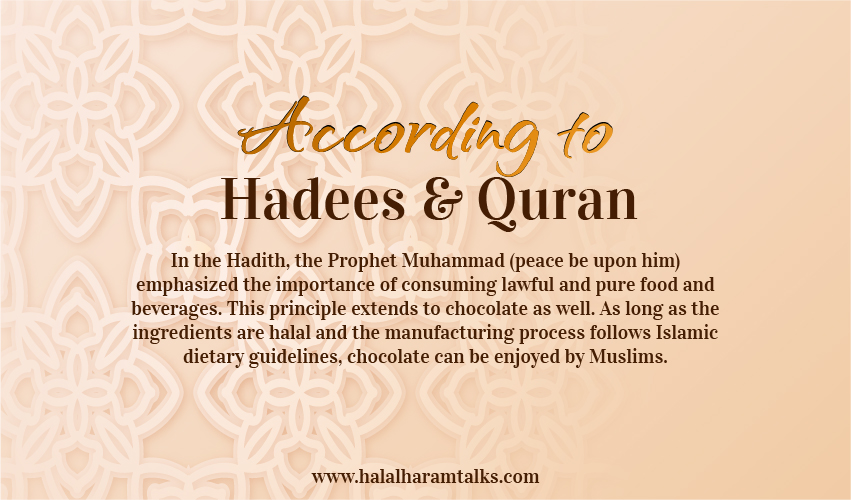Chocolate is a beloved treat enjoyed by people all over the world. However, for Muslims, it’s essential to ensure that the food they consume complies with the principles of their faith. This article aims to provide a comprehensive understanding of whether chocolate is halal (permissible) or haram (prohibited) according to Islamic teachings. We will explore various aspects, including the ingredients used, references from the Quran and Hadith, different schools of thought, certification, and more.
Is Chocolate Halal or Haram?
Determining the status of chocolate in Islam requires a thorough examination of its ingredients and manufacturing process. Generally, chocolate is believed to be halal unless it contains haram ingredients. Ingredients such as alcohol, pork derivatives, and animal-derived additives can render the chocolate haram. However, a significant number of chocolates available in the market are free from haram ingredients, making them permissible for consumption by Muslims.
For more: Are Cheetos Halal
List of Ingredients Used in Chocolate
To understand the halal status of chocolate, it is important to examine the ingredients commonly used in its production. Here is a list of some typical components found in chocolate:
- Cocoa Beans: These are the main ingredient in chocolate and are derived from the cacao tree. They are halal as long as they are not contaminated with haram substances during the manufacturing process.
- Sugar: The primary sweetener used in chocolate, sugar is generally considered halal unless it undergoes a specific refining process that involves the use of bone char.
- Milk: Milk and its derivatives, such as milk powder, are often added to chocolate. If derived from halal sources and the dairy is prepared in accordance with Islamic guidelines, it is considered halal.
- Emulsifiers: Emulsifying agents like lecithin, derived from soybeans, are commonly used in chocolate. These are halal unless derived from non-halal sources.
- Flavorings: Natural and artificial flavorings, if free from alcohol content and derived from halal sources, are permissible in chocolate.
For more: Are Sour Patch Kids Halal
Quran Verse Or Hadith Referring to Chocolate’s Halal Status
While chocolate is not explicitly mentioned in the Quran or Hadith, Islamic principles can be applied to determine its halal status. The Quran guides Muslims to consume what is wholesome and pure. Therefore, if the ingredients used in chocolate are permissible and do not contradict Islamic dietary laws, it is generally considered halal.
In the Hadith, the Prophet Muhammad (peace be upon him) emphasized the importance of consuming lawful and pure food and beverages. This principle extends to chocolate as well. As long as the ingredients are halal and the manufacturing process follows Islamic dietary guidelines, chocolate can be enjoyed by Muslims.

Is Chocolate Liquor Halal?
The term “chocolate liquor” refers to the liquid form of chocolate that contains cocoa solids and cocoa butter. While the name might raise concerns, chocolate liquor does not actually contain alcohol. It is halal, given that it consists of permissible ingredients and does not undergo any process that renders it haram. However, it’s crucial to verify the specific brand and manufacturing process for certainty.
For more: Is Kombucha Halal: An Authentic Guide
Is Lindt Chocolate Halal?
Lindt, a popular chocolate brand, offers a variety of products. Several of their chocolates are halal-certified, indicating they are permissible for consumption by Muslims. Lindt provides detailed information on their packaging or official website regarding the halal status of their products. Always look for reliable halal certifications to ensure compliance with your dietary requirements.
For more: Are Jolly Ranchers Halal: All You Need To Know
Is Ferrero Rocher Halal?
Ferrero Rocher is a well-known chocolate brand loved by many. While some of their products may contain alcohol, many of their chocolates are alcohol-free and suitable for Muslims. As with any brand, it is essential to read the ingredients carefully and look for halal certifications or contact the manufacturer for specific information.
For more: Is Cheddar Cheese Halal
Is Dairy Milk Halal?
Dairy Milk is a popular brand by Cadbury, producing a wide range of chocolates. The halal status of Dairy Milk products can vary depending on the specific variant and country of production. In some regions, Cadbury has obtained halal certification for certain products, while others may be alcohol-free but lack halal certification. It is crucial to check the packaging for halal logos or contact the company directly to obtain accurate information.
For more: Is American Cheese Halal
Is Ritter Sport Halal?
Ritter Sport is a well-established German chocolate brand. Unfortunately, the brand does not have official halal certification. While their ingredients may not contain haram substances, the lack of certification poses uncertainty. Muslims are advised to exercise caution and seek alternatives that are officially halal-certified.
For more: !Is Mozzarella Cheese Halal
Is Chocolate Halal or Haram According to Different Schools of Thought
The four main schools of thought in Islam, namely Hanafi, Maliki, Shafi’i, and Hanbali, have slightly different interpretations and rulings regarding the halal or haram status of certain foods, including chocolate. Here is a brief overview:
- Hanafi School: The Hanafi school, followed by a significant number of Muslims worldwide, considers chocolate to be halal as long as it does not contain any haram ingredients, such as alcohol or pork derivatives. They focus on the permissibility of the individual ingredients used and the absence of explicitly prohibited substances.
- Maliki School: The Maliki school tends to have a more strict approach when it comes to food and beverages. They require a thorough examination of the ingredients and processing methods. Some scholars from this school may have concerns regarding the extensive use of additives and flavorings in chocolates and may require certification or specific assurances for it to be considered halal.
- Shafi’i School: The Shafi’i school, like the Hanafi school, generally considers chocolate to be halal if the ingredients are permissible and there is no contamination with haram substances. However, some scholars within this school may have additional criteria or concerns related to the manufacturing process and the use of additives or emulsifiers, which might require certification or further clarification.
- Hanbali School: The Hanbali school leans towards a more conservative approach in matters of food. While chocolate is generally considered halal, scholars from this school may scrutinize the ingredients and the manufacturing process more rigorously. They may require halal certification or more detailed information to ensure compliance with their strict guidelines.
The Role of Certification in Determining Chocolate’s Halal Status
Certification plays a crucial role in determining the halal status of chocolate products. Halal certification is a process that involves rigorous inspection and examination of the ingredients, manufacturing practices, and facilities to ensure compliance with Islamic dietary laws.
Halal certification ensures transparency and provides assurance to consumers, enabling them to make informed decisions about the products they consume. It involves verifying that the ingredients used are halal, ensuring no cross-contamination with haram substances, and following specific procedures in the manufacturing process.
It is important for Muslims to look for reliable halal certification logos and labels on chocolate products, as this indicates that the product has undergone proper verification by a recognized Islamic authority.
FAQs
Not all chocolates are halal. The permissibility of chocolate depends on the ingredients used and the manufacturing process. Certain ingredients, such as alcohol and pork derivatives, can render chocolate haram. It is important to read the ingredients carefully and look for reliable halal certifications to determine if a particular chocolate product is halal.
While halal certification provides a higher level of assurance, chocolates without halal certification can still be halal if they meet the criteria outlined in Islamic dietary laws. However, it is recommended to seek halal-certified chocolates or consult with knowledgeable individuals to ensure compliance with your religious beliefs.
Not all Lindt chocolates are halal. While Lindt offers some halal-certified chocolates, it is essential to check the packaging or contact the company for specific information on individual products. Look for halal certification logos for reliable confirmation.
Conclusion
Determining the halal status of chocolates involves analyzing the ingredients, manufacturing process, and considering different schools of thought within Islam. Generally, chocolates that do not contain haram ingredients, such as alcohol and pork derivatives, are considered halal. However, it is essential to take individual beliefs and practices into account.
Certification plays a vital role in ensuring the halal status of chocolate products. Halal certification provides transparency and assurance to Muslims, facilitating informed choices. It is advisable to seek chocolates with reliable halal certifications or consult knowledgeable individuals to align with your religious beliefs.
Visit our website to explore further and gain a deeper understanding of what is halal and haram in Islam. Let us strive to make conscious choices in accordance with our faith and lead a wholesome lifestyle.
